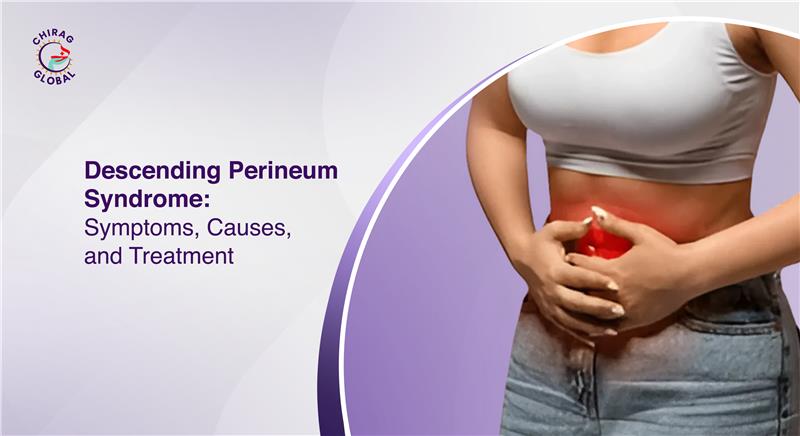Bowel health is often taken for granted until problems begin to affect daily life. Chronic constipation, straining, or difficulty with bowel movements can sometimes indicate an underlying pelvic floor disorder. One such condition is Descending Perineum Syndrome (DPS).
Though not widely known among the public, DPS is an important cause of pelvic floor dysfunction. It can significantly reduce quality of life if left untreated, but with proper diagnosis and treatment, patients can find relief.
This article explains what DPS is, its symptoms, causes, diagnosis, and available treatments, in language designed for everyday readers while maintaining medical accuracy.
What is Descending Perineum Syndrome?
Descending Perineum Syndrome (DPS) is a condition where the perineum, the area between the anus and genitals, drops lower than normal during straining or bowel movements.
In a healthy pelvic floor, the perineum moves slightly downward when you pass stool, but in DPS, this downward movement becomes excessive. Over time, the tissues and muscles of the pelvic floor become stretched and weakened, leading to bowel and urinary dysfunction.
DPS is more common in middle-aged and older women, often related to childbirth trauma or chronic straining from constipation. However, men can also develop the condition.
Symptoms of Descending Perineum Syndrome
The symptoms of DPS may vary, but most patients experience difficulties related to bowel movements and pelvic support. Common signs include:
- Chronic constipation despite a high-fibre diet and hydration
- Straining excessively during bowel movements
- Sensation of incomplete evacuation
- Needing to use fingers (digital assistance) to empty the rectum
- Feeling of heaviness or bulging in the pelvic area
- Rectal prolapse (rectum protruding outside the anus in severe cases)
- Urinary incontinence (leakage of urine) or difficulty emptying the bladder
- Pelvic or lower back pain
Unlike occasional constipation, these symptoms are persistent and worsen over time, requiring medical attention.
What Are Its Causes and Risk Factors?
Descending Perineum Syndrome usually develops over time due to a combination of structural damage, muscle weakness, and lifestyle factors.
1. Structural Causes
- Childbirth trauma — Vaginal deliveries, especially multiple or difficult births, can stretch or injure pelvic muscles and nerves.
- Pelvic surgery — Hysterectomy or rectal surgery may weaken support structures.
- Chronic rectal prolapse — Long-term prolapse worsens perineal descent.
2. Functional Causes
- Chronic constipation — Regular straining puts pressure on the pelvic floor.
- Pelvic floor muscle weakness — Ageing or nerve dysfunction leads to reduced muscle control.
3. Risk Factors
- Female gender (especially after childbirth)
- Ageing (weaker muscles and tissues
Obesity (extra pressure on the pelvic floor)
- Long-term laxative abuse
- Chronic respiratory conditions (coughing increases pelvic pressure)
How Does This Condition Affect the Body?
The pelvic floor is responsible for supporting the bladder, uterus (in women), and rectum. When it becomes overstretched, several complications can arise:
- Digestive issues: Long-term constipation, incomplete evacuation, rectal prolapse.
- Urinary problems: Incontinence or retention due to weak support.
- Sexual dysfunction: Pain or reduced sensation during intercourse.
- Quality of life impact: Embarrassment, social withdrawal, anxiety, and reduced physical activity.
Without treatment, DPS may progress, making daily life increasingly difficult.
Conclusion
Descending Perineum Syndrome is a lesser-known but significant condition associated with bowel difficulties and reduced quality of life. It develops due to muscle weakness, structural damage, and long-term straining, particularly in women after childbirth.
The condition is treatable with lifestyle changes, physiotherapy, biofeedback, medications, and, in severe cases, surgery. At the same time, holistic support through Ayurvedic therapies such as Basti, dietary regulation, and pelvic floor strengthening practices can further enhance bowel health and improve outcomes.
Chiraayu, the Ayurvedic wing of Chirag Global Hospitals, offers an integrative approach to managing Descending Perineum Syndrome, blending modern medical expertise with traditional Ayurvedic therapies to help patients regain comfort, balance, and quality of life.
If you or a loved one struggles with chronic constipation or pelvic floor symptoms, do not ignore them; consult a specialist promptly.
Visit us to know more about: Descending Perineum Syndrome





Comments